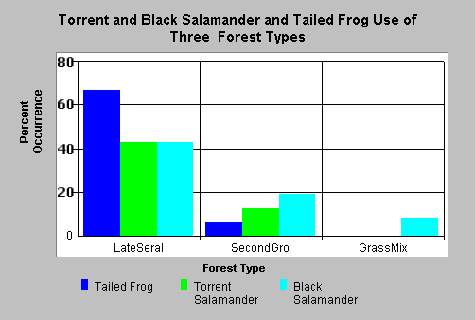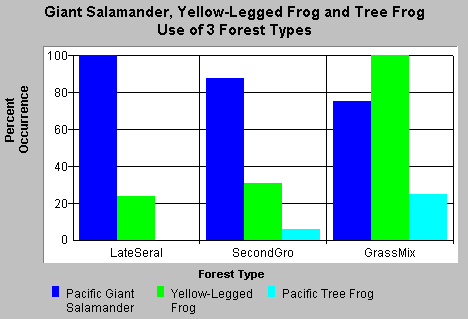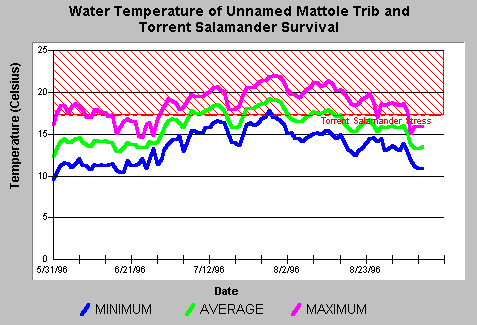 |
 |
| Background | Hypotheses | Bibliography | Maps | Home |
 |
 |
| Background | Hypotheses | Bibliography | Maps | Home |
Amphibian Information in KRIS Ten Mile
![]()
Data below shows Redwood Sciences Lab findings about the relationship between forest canopy conditions and the presence and absence of sensitive amphibians in the Mattole River watershed (Welsh, unpublished data). The tailed frog still occurs in the KRIS Mendocino project area but no southern torrent salamanders have been noted in recent years. See Distribution of Sensitive Amphibians in the KRIS Mendocino Project Area for notes on occurrence of these animals.

Data provided from work in progress at US Forest Service Redwood Science
Lab, Arcata
The Chart above shows that tailed frogs and southern torrent salamanders require habitat conditions provided by late seral (Late Seral) or old-growth forests and these species are greatly diminished in second growth forest (SecondGro) habitats. Neither of the species occur in mixed forest/grassland (GrassMix) ecosystems. The black salamander finds optimal habitat in late seral forests streams, but fewer numbers are also found in other forest types.
![]()

Data provided from work in progress at US Forest Service Redwood Science
Lab, Arcata
The graph above shows that Pacific giant salamanders are most abundant in late seral forests but still thrive in second growth and even mixed grassland/forest habitats. Yellow-legged frogs actually increase as canopy decreases. Pacific tree frogs were not found in late seral environments and are most abundant in grassland/forest habitats.
![]()

Data provided from work in progress at US Forest Service Redwood Science
Lab, Arcata
The water temperature of this unnamed tributary of the Mattole River reaches levels that are stressful or lethal for southern torrent salamanders (17.2 degrees C). This tributary, which enters the Mattole downstream of Little Finley Creek, had torrent salamanders prior to logging. It represents the mixed second growth/grassland forest type in the Redwood Sciences Lab studies from which these data were derived.
![]()
References
Welsh, H.H. Redwood Sciences Laboratory, Arcata, CA.
![]()
| www.krisweb.com |